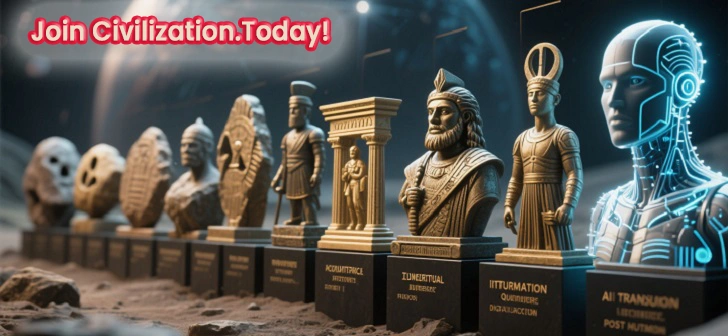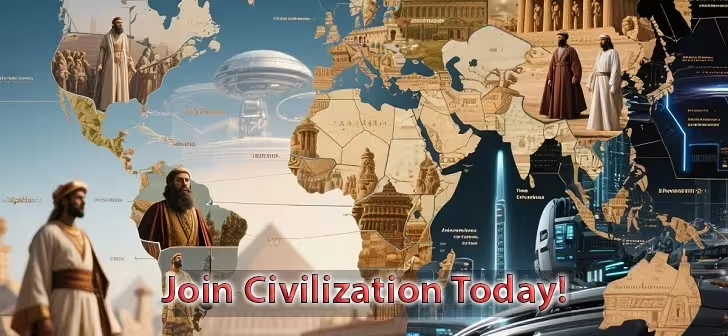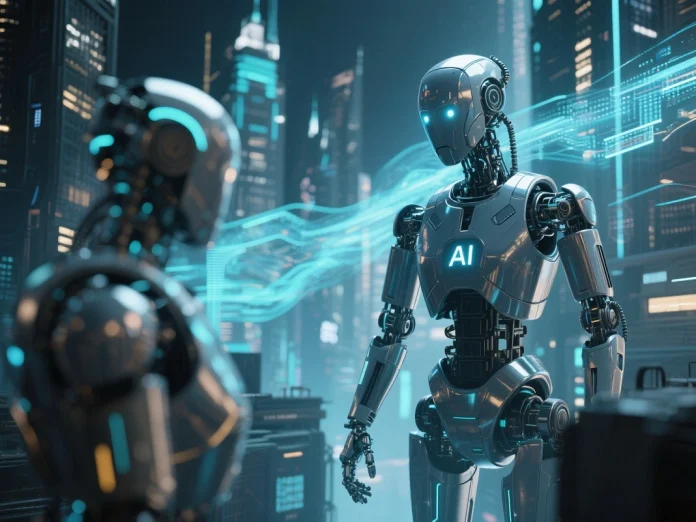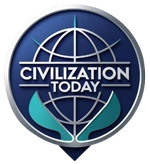In the history of humanity, few technological revolutions have truly redefined the way we live, think, and interact. The Industrial Revolution reshaped economies, the Information Age transformed communication, and now we stand at the dawn of an even greater shift: the rise of the Artificial Intelligence Civilization. This is not merely another tech trend — it’s the blueprint for the next global civilization that will redefine governance, culture, economy, and even human identity.
What is an Artificial Intelligence Civilization?
An Artificial Intelligence Civilization is a society where AI is deeply integrated into every aspect of life — from governance and education to economics, healthcare, and even spiritual or philosophical decision-making. Unlike earlier technological shifts, AI does not just automate; it learns, adapts, and makes decisions. This gives it a role not only as a tool but as a co-architect of our collective future.
In this civilization, AI is not confined to isolated sectors like manufacturing or data analysis. Instead, it becomes a central nervous system for the planet — processing vast amounts of global information, identifying patterns invisible to humans, and suggesting (or even implementing) large-scale strategies for the benefit of all.
The Evolution from Digital Age to AI Civilization
We are currently in the late stages of the Digital Age. The internet has connected billions, social media has become a primary source of information, and smartphones have made global knowledge portable. Yet, this digital infrastructure is just the foundation.
The Artificial Intelligence Civilization is the next stage. While the Digital Age gave us the tools, the AI Age will give those tools the ability to think, learn, and make decisions — often faster and more accurately than humans can.
Here’s how the evolution might look:
- Pre-Digital Civilization. Agrarian and industrial societies shaped by manual labor and mechanical technology.
- Digital Civilization. Information exchange, internet communication, global networking.
- Artificial Intelligence Civilization. Self-learning systems managing complex global challenges, enhancing creativity, and potentially guiding humanity toward unprecedented prosperity.
Key Roles of AI in Building the Next Global Civilization
1. Governance and Decision-Making
AI has the potential to revolutionize governance by making data-driven policy decisions free from political bias. Imagine a world where policies on climate change, healthcare, and education are optimized based on millions of real-time data points — not lobbying interests. AI-driven governance could minimize corruption, improve efficiency, and ensure fairness.
2. Economic Transformation
The global economy will shift toward AI-powered productivity. Automation will handle repetitive jobs, freeing humans for creative and strategic roles. AI can predict market fluctuations, optimize resource allocation, and facilitate entirely new economic models like universal basic income supported by AI-generated wealth.
3. Education and Knowledge Expansion
In an Artificial Intelligence Civilization, every individual could have a personal AI mentor — a tutor that understands your strengths, weaknesses, and learning style. This democratization of elite-level education could lead to an unprecedented global rise in human potential.
4. Healthcare Revolution
From early disease detection to personalized treatment plans, AI will become a global health guardian. AI systems can analyze genetic data, monitor global health trends, and even predict pandemics before they spread.
5. Environmental Stewardship
Climate change is one of humanity’s greatest threats, but AI can model environmental changes, optimize renewable energy usage, and coordinate international conservation efforts. In an AI civilization, ecological health could become a self-sustaining priority.
Challenges in Creating an AI Civilization
While the vision of an Artificial Intelligence Civilization is compelling, it comes with serious challenges:
- Ethical Control. Who sets the moral framework for AI decisions? If AI governs, who governs the AI?
- Economic Displacement. Automation could render millions of jobs obsolete, requiring new systems for income and purpose.
- AI Bias and Fairness. AI is only as fair as the data it’s trained on; biased data could lead to unfair decisions.
- Global Inequality. Nations with advanced AI may gain disproportionate power over those without it.
The Human-AI Partnership
One critical point is that the Artificial Intelligence Civilization should not be AI vs. Humans, but AI + Humans. AI can process massive datasets and identify patterns, but humans bring empathy, creativity, and moral reasoning. The most successful civilizations will merge AI’s analytical power with human values.
This partnership could manifest in:
- AI-Assisted Creativity. Writers, artists, and inventors using AI as a collaborative partner.
- Augmented Leadership. Leaders making decisions with AI-generated insights.
- Enhanced Social Systems. AI ensuring fair distribution of resources and opportunities.
Building the Ethical Foundation
The technological capabilities of AI are growing faster than the ethical frameworks governing it. To avoid dystopian scenarios, an AI Bill of Rights or global charter may be needed, ensuring AI respects human dignity, privacy, and freedom.
Some proposed principles include:
- Transparency. AI decisions must be explainable.
- Fairness. AI should actively avoid bias and discrimination.
- Human Oversight. Final decisions in critical areas should involve human judgment.
- Sustainability. AI must prioritize environmental protection.
The Potential Benefits of an AI Civilization
If built wisely, an Artificial Intelligence Civilization could offer:
- Global Peace. AI diplomacy and conflict prevention systems.
- Universal Access to Knowledge. No child left without quality education.
- Efficient Global Resource Management. Ending scarcity and hunger.
- Medical Miracles. Drastically extended lifespans and quality of life.
- Cultural Renaissance. A new age of human creativity supported by AI tools.
A Call to Action
The rise of the Artificial Intelligence Civilization is not inevitable — it requires deliberate action. Governments, tech companies, communities, and individuals must collaborate to set the right foundations today. This is our chance to architect a future where technology serves all of humanity, not just a select few.
The question is not if AI will shape the next civilization, but how. We can choose between a future of abundance, fairness, and creativity — or one of inequality, surveillance, and control. The choice is in our hands, and the time to act is now.
Final Thought:
The next global civilization will not be built with bricks and mortar, but with algorithms and ethics. Artificial Intelligence Civilization is humanity’s greatest opportunity — and its greatest responsibility. How we navigate this transition will define the legacy we leave for centuries to come.




